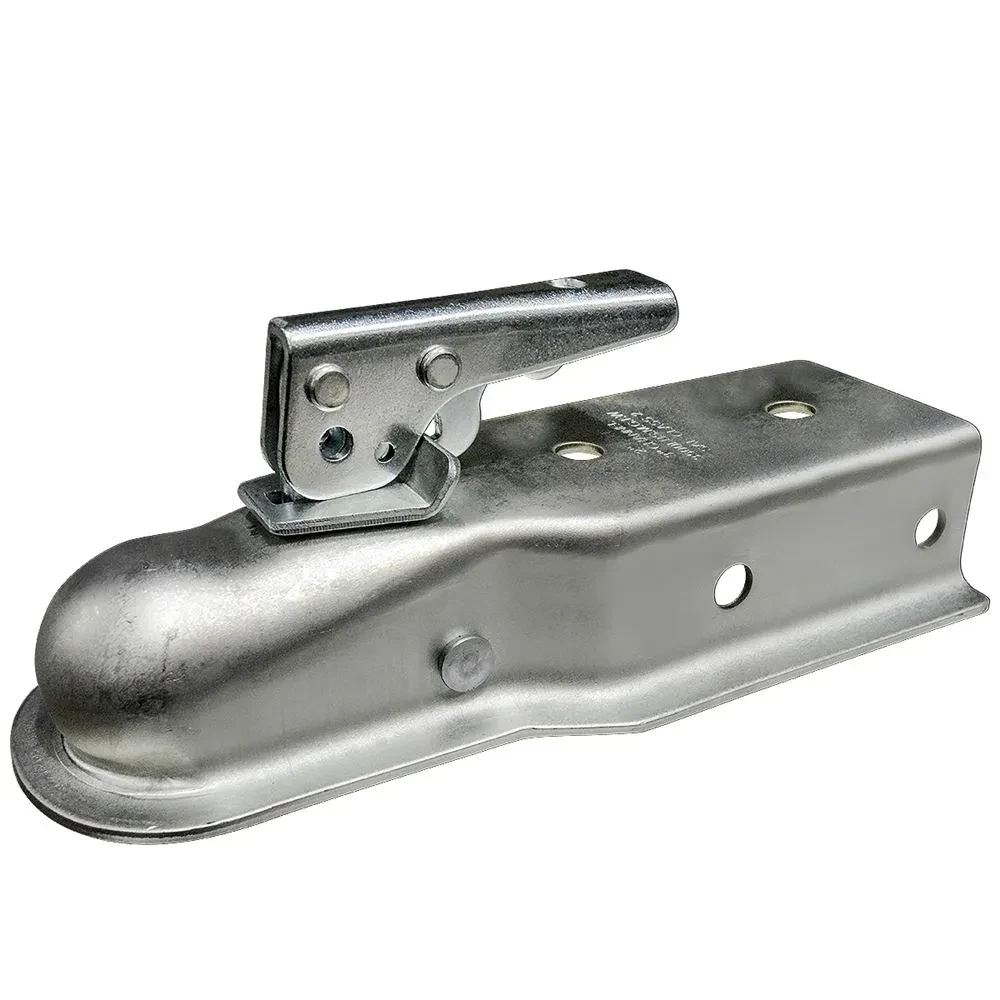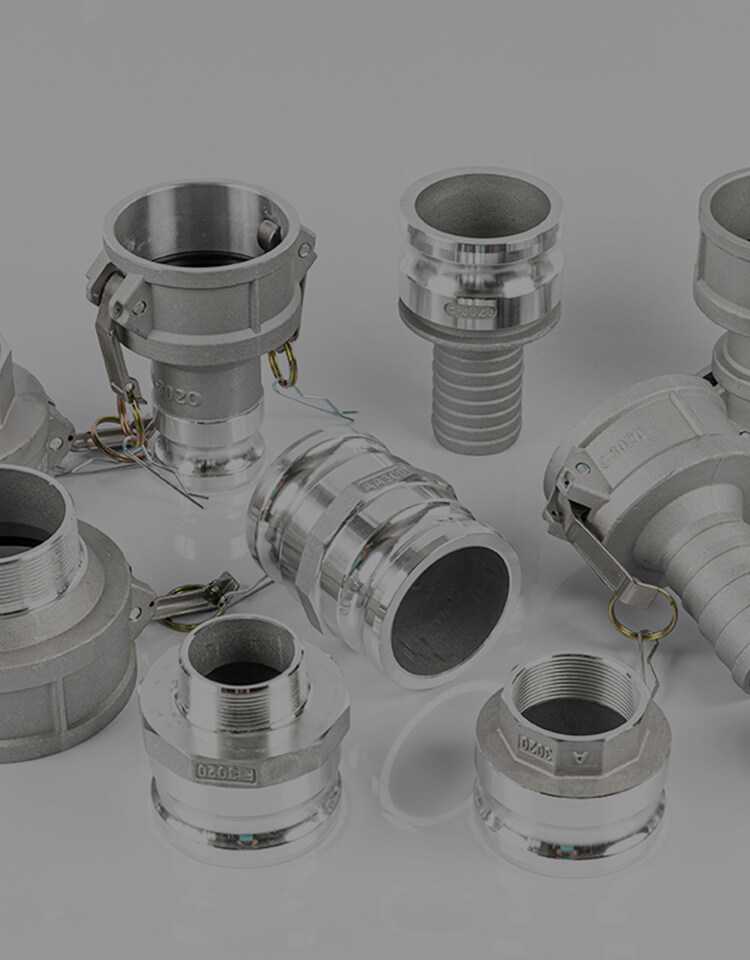E-Mail-Formatfehler
emailCannotEmpty
emailDoesExist
pwdLetterLimtTip
inconsistentPwd
pwdLetterLimtTip
inconsistentPwd

Nachricht
Hier können Sie einen Text beschreiben, den Sie ausdrücken möchten

Tractor Supply Trailer Coupler: Ensuring a Secure and Reliable Connection for Your Towing Needs
Towing with a tractor is a task that requires not just power and precision but also a dependable connection between the tractor and the trailer. The tractor supply trailer coupler is the linchpin in this relationship, a device designed to ensure that your trailer is securely attached to your tractor, no matter the load or the road conditions. In this comprehensive guide, we’ll delve into the world of tractor supply trailer couplers, exploring their importance, how to select the right one for your needs, and the role of manufacturers like sleeve coupling manufacturers and sink waste coupling manufacturers in providing high-quality components.
As we navigate through the intricacies of tractor supply couplers, we’ll also touch upon the advanced towing solutions offered by tractor supply hydraulic coupler systems, which provide enhanced performance and ease of use. With insights from industry experts and real-world case studies, this blog post will equip you with the knowledge to make informed decisions about your tractor towing setup, ensuring safety, reliability, and efficiency in all your towing endeavors.
The Importance of a High-Quality Tractor Supply Trailer Coupler
Safety First: The Role of Trailer Couplers in Towing
It is not just a piece of metal; it’s a critical safety component that bears the responsibility of keeping your trailer attached to your tractor. A high-quality coupler ensures that the trailer won’t detach while in motion, which could lead to catastrophic accidents, especially at high speeds or on busy roads. The coupler must be robust enough to handle the specified weight of the trailer and its contents without failing.
Understanding the Mechanics of Tractor Supply Couplers
It works by clamping onto the hitch ball of the tractor, creating a pivot point that allows for smooth towing. It’s designed to be easy to connect and disconnect while providing a secure lock during transport. The coupler includes a locking mechanism to prevent accidental release, and some models come with additional safety features like secondary locking devices.
The Consequences of a Poor-Quality Trailer Connection
Using a substandard tractor supply trailer coupler can lead to a range of problems, from annoying rattles and instability to the loss of your trailer on the road. A poor connection can also cause undue wear on both the tractor and the trailer, leading to costly repairs and downtime. In the worst-case scenario, it can result in accidents that cause property damage, personal injury, or even fatalities.
Selecting the Right Tractor Supply Trailer Coupler
Assessing Your Towing Requirements
Before purchasing a tractor supply trailer coupler, you need to assess your towing requirements. Consider the weight and type of the trailers you’ll be towing, the conditions you’ll be operating in (such as off-road or on highways), and the frequency of use. This information will help you determine the size and type of coupler you need, as well as any additional features that might be beneficial.
Compatibility: Matching Couplers with Your Tractor and Trailer
It’s crucial to ensure that the trailer coupler you choose is compatible with both your tractor and your trailer. The coupler must fit the hitch ball size on your tractor and be rated for the weight of your trailer. Additionally, the height and width of the coupler should match your trailer’s tongue to ensure a snug fit.
Features to Look For in a Tractor Supply Trailer Coupler
When selecting a trailer coupler, look for features that enhance safety and ease of use. A coupler with a quick-lock mechanism can save time and hassle, while an adjustable coupler can be fine-tuned for a perfect fit. Corrosion-resistant materials are essential for longevity, especially if you’ll be operating in harsh environments.
Installation and Maintenance of Tractor Supply Trailer Couplers
Step-by-Step Guide to Installing Your Tractor Supply Coupler
Installing is a straightforward process that requires some basic tools and mechanical know-how. Here’s a simplified guide to get you started:
Inspect the Hitch and Coupler: Before installation, inspect the tractor’s hitch and the new coupler for any signs of damage or wear.
Remove the Old Coupler: If replacing an existing coupler, unbolt and remove it from the trailer tongue.
Position the New Coupler: Slide the new coupler onto the trailer tongue, ensuring it aligns with the pre-drilled holes.
Secure the Coupler: Using bolts and nuts, secure the coupler to the trailer tongue. Torque the bolts to the manufacturer’s specifications.
Attach the Safety Chains: Connect the safety chains from the trailer to the tractor, ensuring they have enough slack for turns but won’t drag on the ground.
Test the Connection: Lower the coupler onto the tractor’s hitch ball and lock it in place. Test the connection by gently pulling the trailer to ensure it’s secure.
Routine Checks and Maintenance Tips
Regular maintenance of your tractor supply trailer coupler is essential for safe and reliable towing. Here are some maintenance tips:
Lubrication: Regularly lubricate the moving parts of the coupler, such as the locking mechanism and the hinge, to ensure smooth operation.
Inspection: Before each use, inspect the coupler for signs of rust, corrosion, or damage. Pay special attention to the locking mechanism to ensure it’s functioning correctly.
Cleaning: Keep the coupler clean from dirt, grime, and debris that could impede its function.
Tightening: Periodically check and tighten the bolts that secure the coupler to the trailer tongue.
Troubleshooting Common Coupler Issues
Even with proper maintenance, you may encounter issues with your tractor supply trailer coupler. Common problems include difficulty in locking or unlocking the coupler, excessive play or movement, and unusual noises during towing. If you experience any of these issues, consult the manufacturer’s guidelines or seek professional assistance to address the problem promptly.
Advanced Towing Solutions: Tractor Supply Hydraulic Coupler
The Advantages of Hydraulic Couplers in Towing
For those looking for an upgrade from the standard mechanical couplers, a tractor supply hydraulic coupler offers several advantages. Hydraulic couplers provide smoother operation, easier coupling and uncoupling, and better shock absorption, which can lead to reduced wear on both the tractor and the trailer.
How to Upgrade to a Tractor Supply Hydraulic Coupler
Upgrading to a hydraulic coupler typically involves replacing the existing mechanical coupler with a hydraulic model that matches your tractor and trailer specifications. It’s important to consult with a professional or a knowledgeable supplier to ensure compatibility and proper installation.
Maintenance Tips for Hydraulic Coupling Systems
Hydraulic couplers require regular checks of the hydraulic fluid levels and the integrity of the hydraulic lines. Keep an eye out for leaks or damage to the hoses and fittings, and replace any worn parts immediately to maintain the system’s performance and safety.
The Role of Manufacturers in Tractor Supply Trailer Couplers
Sleeve Coupling Manufacturers: Innovations and Quality
Sleeve coupling manufacturers play a crucial role in the development of high-quality tractor supply trailer couplers. They are constantly innovating to create couplers that are stronger, more durable, and easier to use. When selecting a coupler, consider those made by reputable sleeve coupling manufacturers known for their commitment to quality and innovation.
Sink Waste Coupling Manufacturers: Adapting to Tractor Needs
While sink waste coupling manufacturers may not be the first that come to mind for tractor supplies, their expertise in precision manufacturing and material selection can be invaluable. These manufacturers have adapted their skills to produce robust and reliable couplers suitable for the demanding conditions of tractor towing.
How Sink Coupling Manufacturer Expertise Benefits Tractor Owners
The expertise of sink coupling manufacturers in creating watertight seals and durable connections translates well into the design. Their attention to detail and quality assurance ensures that the couplers can withstand the rigors of agricultural and industrial use.
Ensuring Durability: Materials and Manufacturing Processes
The Science Behind High-Strength Coupler Materials
The durability is largely determined by the materials used in its construction. High-strength steel is a common choice due to its resilience and ability to withstand significant stress without deforming. Some couplers may also be made from alloys that offer a balance between strength and weight, or even composite materials that provide corrosion resistance. Understanding the properties of these materials can help you make an informed decision when selecting a coupler.
Manufacturing Processes: Precision and Quality Control
The manufacturing process is just as important as the materials used. Precision engineering is crucial to ensure that each coupler meets strict tolerances and performance standards. Quality control measures, such as dimensional checks, material testing, and load testing, are implemented by manufacturers to guarantee that the final product is reliable and safe for use.
The Impact of Material Choice on Coupler Longevity
The choice of material not only affects the strength and durability of the coupler but also its longevity. Materials that are resistant to rust and corrosion, such as stainless steel or those with protective coatings, will last longer and require less maintenance. This is particularly important in harsh environments where exposure to moisture, chemicals, or salt can quickly degrade metal components.
Custom Solutions: Working with Manufacturers for Unique Needs
When Off-the-Shelf Isn’t Enough: Custom Couplers
Sometimes, standard couplers may not meet the specific requirements of your towing setup. In such cases, working with manufacturers to create custom couplers can be the solution. Custom couplers can be designed to handle unique loads, fit non-standard hitch sizes, or accommodate special features that enhance safety or usability.
Collaborating with Sleeve Coupling Manufacturers for Custom Designs
Collaborating with reliable manufacturers can provide access to their expertise in creating custom-designed couplers. These manufacturers can work with you to understand your specific needs and develop a solution that ensures optimal performance and safety. They can also advise on the best materials and manufacturing processes for your custom coupler.
The Process of Custom Coupler Fabrication
The process of fabricating a custom coupler typically involves several steps, including design, prototyping, testing, and production. Advanced technologies such as CAD (Computer-Aided Design) and CNC (Computer Numerical Control) machining are often used to create precise components. Prototypes are then tested under real-world conditions to ensure they meet the required specifications before moving to full-scale production.
Legal and Safety Regulations for Towing
Understanding Towing Capacity and Legal Limits
When towing with a tractor, it’s essential to understand the towing capacity of your equipment and adhere to legal limits. Overloading a trailer can lead to coupler failure and pose serious safety risks. Make sure to consult your tractor and trailer manuals for capacity information and check local regulations regarding towing weights and requirements.
Safety Certifications for Tractor Supply Trailer Couplers
Reputable manufacturers ensure that their couplers meet or exceed safety certifications. These certifications indicate that the coupler has been tested and meets specific safety standards. Look for couplers that have been certified by recognized industry bodies to ensure you’re getting a product that’s been rigorously evaluated for safety.
Staying Compliant: What Tractor Owners Need to Know
Staying compliant with towing regulations is not just about adhering to weight limits. It also involves ensuring that your coupler is properly installed, that safety chains are correctly attached, and that lighting and signaling systems are functioning. Regular inspections and maintenance are key to remaining compliant and avoiding penalties or accidents.
Case Studies: Tractor Supply Trailer Coupler in Action
Real-World Applications and Success Stories
To illustrate the importance of choosing the right coupler, consider real-world case studies where the right coupler made a significant difference. Success stories from farmers, construction workers, and logistics professionals can provide insights into how a reliable coupler can improve efficiency and safety in various scenarios.
How the Right Coupler Made a Difference in Towing Efficiency
In one case, a farmer may have switched to a tractor supply hydraulic coupler, which allowed for quicker attachment and detachment of trailers, saving valuable time during the busy harvest season. The hydraulic coupler also provided better shock absorption, reducing wear on the tractor and trailer and leading to lower maintenance costs.
Lessons Learned from Towing Mishaps
On the other hand, learning from towing mishaps can be just as valuable. A case study where a substandard coupler failed could highlight the potential dangers and costs associated with cutting corners on towing equipment. These lessons can serve as a reminder of the importance of investing in quality components for towing.
Conclusion: The Integral Role of Tractor Supply Trailer Couplers
Recap of Key Points on Tractor Supply Trailer Couplers
In conclusion, the tractor supply trailer coupler is a vital component in any towing setup. It ensures the safety and reliability of your connection to the trailer, and choosing the right coupler is essential. Remember to consider the materials, manufacturing processes, and compliance with safety regulations when selecting a coupler.
The Future of Towing: Trends in Coupler Technology
As we look to the future, trends in coupler technology may include advancements in materials, design, and smart features that provide enhanced safety and convenience. Innovations from sleeve coupling manufacturers and other industry experts will continue to drive improvements in towing technology.
Final Thoughts on Choosing and Maintaining Your Coupler
Ultimately, the key to successful towing is choosing a high-quality tractor supply trailer coupler and maintaining it properly. By following the guidance provided in this post, tractor owners can ensure that their towing operations are as safe and efficient as possible.

